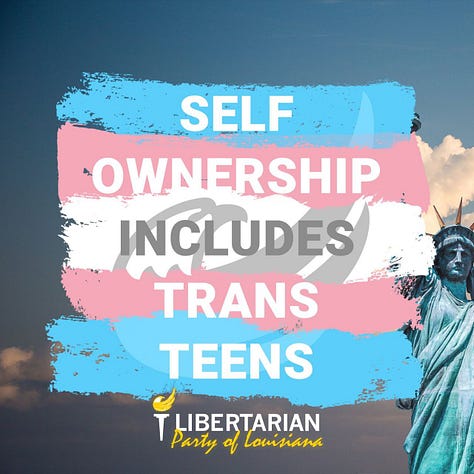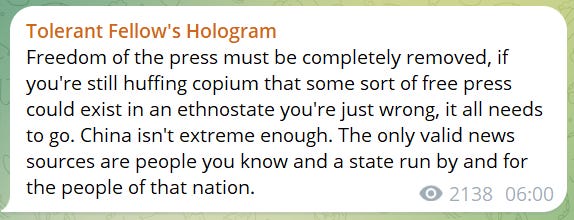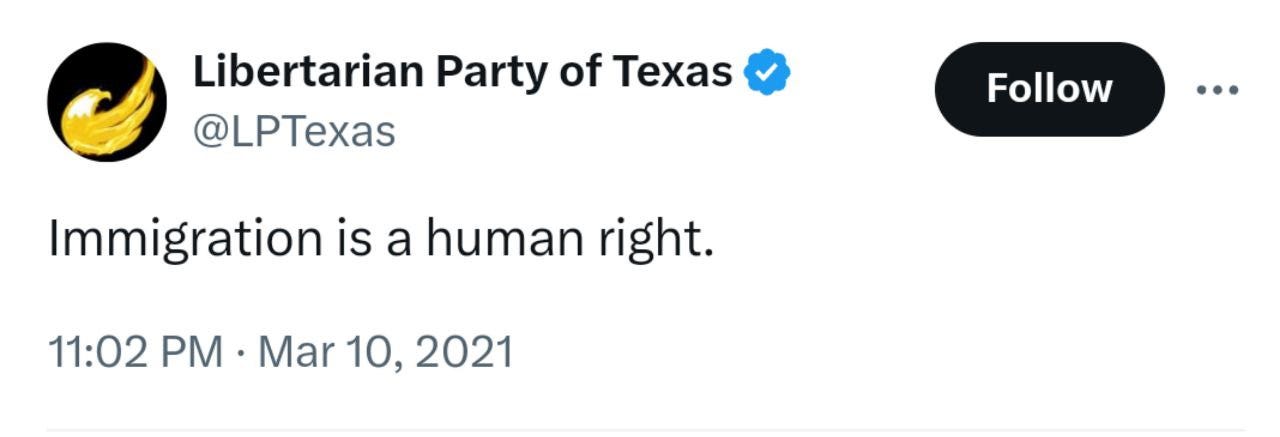Part 2 of 3 (Part 1 here, Part 3 here)
The past decade or two have has seen the rise and fall of an alternative to mainstream conservatism in libertarianism. If we were to use the political compass as a model, conservatism would sit in the centre between the upper and lower right quadrants, while libertarianism would be found in the lower right quadrant.
The selling point of libertarianism was the reduction of government regulations and state power in favour of increased personal liberty and autonomy. Libertarianism became a trendy alternative to the mainstream Right during the 2000s and 2010s. Libertarians held several positions in common with the mainstream Right such as the reduction of taxes and opposition to gun control, but also opposed foreign military intervention and the expansion of state surveillance, policies which many conservatives supported during the 2000s.

Libertarianism was certainly appealing for many on the Right. Afterall, excessive taxation and government regulation, increasingly restrictive gun ownership laws, wasteful expenditures on wars in the Middle East, and the encroaching surveillance state are all examples of government overreach many were dissatisfied with. Opposing the increasingly intrusive expansion of government into all aspects of modern life was what gained libertarianism a following. It was libertarianism’s slide into quixotism which lost it.
While they shared a lot in common with the Right, some libertarians also embraced several ideas associated with the Left such as the decriminalization of drugs, more liberal immigration policies, and support for the LGBT movement. They argued that the government shouldn’t be able to dictate which substances an individual can or cannot take, that free movement of labour is an essential part of the free market, and that the LGBT movement was a matter of personal liberty. There was a libertarian meme back in the day that they wanted gay couples using their guns to defend their privately owned marijuana farms.
This created a divide within libertarianism, as it was at odds with the socially conservative leanings of a lot of libertarians, while others argued it was consistent with their underlying principles. Most who had adopted libertarianism didn’t have armed homosexuals selling drugs to their children in mind as their idea of “liberty”. It didn’t stop there, however. Libertarians took the idea “government=bad, free market=good” and ran with it to the point of absurdity. Libertarians started calling for the abolition of all taxation and the entire governmental and state apparatus. Libertarianism became a one-upmanship contest where one would prove their cred by proclaiming how strongly they were opposed to government regulation, no matter how insane the policies they were arguing for were.
This resulted in libertarians taking ludicrous positions under the premise that less government is always better. You could meet libertarians who would argue that it should be legal to sell illicit drugs to children, that police forces should be abolished all together, that countries should have no borders at all, that child labour should be legalized, or that you shouldn’t need a licence in order to drive a car. Some rather repulsive individual identifying as libertarians even went so far as to argue that age of consent laws should be abolished, because that’s “government”.






Not only did this quixotic pissing contest make libertarianism look unserious and infantile, the years following 2016 have totally discredited their ideology. For example, during the wave of mass censorship of the internet from 2017-2021, the discussion online within right-wing and centre-right circles turned to the need for legislation to prevent social media companies from banning users for legal political speech alone.
As they fall under the umbrella of the broader political Right, many libertarians found themselves the targets of censorship too. Nevertheless, they still argued against any kind of legislation preventing social media companies from enacting censorship on the grounds that these were private companies, and thus government intervention to regulate them is wrong. Libertarians’ quixotism got them to the point where they opposed legislation designed to protect they themselves against censorship at the hands of a private company. They tried to cram this issue through the frame of their ideology by arguing that if a company censored content viewers wanted to see, the market would punish the company and reward free speech alternatives.
This has been proven wildly incorrect as the engagement dissident right content creators get on alternative platforms today is merely a fraction of that which they got in 2016 before the major push for online censorship. But even this didn’t get libertarians to change their opinions. When President Donald Trump was banned from Twitter in 2021 while still in office, rather than seeing this as an egregious affront to freedom of speech and a warning sign of impending corporate tyranny, some libertarians actually rejoiced. Why? Because it was being done by a private company.

Another product of their quixotic thinking is that many libertarians have argued for open borders and unlimited immigration on the grounds that the market demand for labour should determine immigration and that the state doesn’t have the right to regulate this. Whenever the issue of illegal immigration crops up in the United States, libertarian parties are sure to chime in, arguing that there shouldn’t be a border at all. If you want a smaller state and lower taxes, this is an insane position to take as it has been long established that non-white immigrants overwhelmingly side with the left and favour the expansion of the welfare state. It’s how they transfer wealth from the white population to themselves. Yet, libertarians continue to argue for open borders because of this idiotic first principle that any use of government force is always bad.





Libertarians disregard the burning issues of our time (demographics, nihilism, social atomization, etc.) by accusing those who are confronting them of being “statists” or “collectivists”. They often respond with the phrase “How does this affect you personally?” The reality is that the collective stability and wellbeing of society matters to everyone, and you can’t simply close yourself off in a little bubble and expect to be left alone.
We could have safe, prosperous, and cohesive countries again, though part of the solution would include strict immigration policies, competent police forces, and a crackdown on subversive elements in media and education. But many libertarians would have none of this because it would involve the use of… THE STATE! So instead, libertarians are out there raving about how wonderful it is that illegal immigrants are being allowed to purchase firearms.
This obsession with ideology and total disregard for the reality of the world we actually live in got many on the Right to abandon libertarianism. One of the many lessons COVID taught us is that the line between government and big business is being blurred. The two almost function as one entity today. It’s now referred to as public-private partnership. Both the state and corporations colluded in order to impose themselves into the minutest aspects of everyone’s lives for two years. And even after COVID, we still see smaller scale collusion of this nature all the time. The quixotism of libertarians has gotten them to the point that they would support themselves being hauled off to the gulag as long as that gulag was run by a private company and not the state.
In response to the fall of libertarianism into outlandishness, a new strand of the Right became trendy in the late 2010s and early 2020s. Referring back to the Political Compass, while libertarianism sits on the bottom right quadrant, this ideology sits on the top right. While I’m sure most of my readers will already agree with me on my criticisms of the quixotism of conservatism and libertarianism, I imagine I will step on a few toes with what I will write next. However, I feel for that reason, this is even more important to say.
For the purposes of this essay, I will refer to this ideology as Third Positionism. Third Positionism came into existence in the early 20th century following WWI in opposition to the rise of communism, but also as an alternative to capitalism. Iterations of this worldview took hold in Italy in the form of Fascism and Germany in the form of National Socialism during the interwar period, but died off following the defeat of these regimes in WWII.
The events of the past decade have exposed just how untenable of a position libertarianism is. There’s the broader issue of the emptiness and nihilism which the materialistic consumerism of neoliberalism has brought about, and the more recent phenomenon of how ideologically progressive major corporations have become. In the era of Woke Capital, it’s clear as day that big business just as responsible for the ills facing our society as Western governments are and that any realistic solution to our problems would involve bringing privately-held capital to heal.
A portion of libertarians embraced the concept of race realism throughout the 2010s. For many libertarians, this caused a shift in their core principles from limited government to ethnic nationalism. In the second half of the 2010s, this became known as “the libertarian to Alt-Right pipeline”. From there, many former libertarians began to rethink their prior stance that government intervention is always a bad thing and accept that at least a degree of government power will be necessary in a stable society. They, along with former conservatives and even some converted former leftists make up what is broadly referred to today as the Dissident Right.
Third Positionism became a popular ideology among the Dissident Right in the late 2010s and early 2020s. Along with ethnic nationalism and race realism, this strand of the Dissident Right favours a more socialistic economy in opposition to neoliberal capitalism, advocates a strong state and the use of government force, opposes classically liberal values, and puts a strong emphasis on the issue of Jewish influence and Zionism within the elite class.
As with libertarianism, I see the initial appeal. Race realism and collective ethnic identity were glaring omissions from conservatism and most iterations of libertarianism. The neoliberal capitalism which the Right supported for decades is a problem, and is even more so in the age of Woke Capital. Privatization is not always better. If you’re serious about attaining power, you can’t shy away from using the force of the state. The Jewish Question is likewise a pressing one. Jews have had a massively disproportionate amount of power in Western countries for decades now and they’ve done more than any other group to promote mass Third World immigration, anti-white narratives, feminism, homosexuality, affirmative action, and censorship.
These have become standard dissident right positions, and these are essential issues to confront for anyone hoping to build a more ordered and stable society. So, this perspective offered a very legitimate critique of mainstream right-wing thought up to that point. But the Third Positionist strand of the Right, as well as many on the Dissident Right more broadly eventually found themselves guilty of quixotism too, just as conservatism and libertarianism before them.
What happened with the Third Positionists is that they became obsessed with certain aspects of this worldview to the point that they overshadowed more important ones. This was largely the result of both an unhealthy obsession with 1930s Germany as well as excessive contrarianism against mainstream conservatism and libertarianism. While the Jewish Question is an important aspect of understanding the nature of power in the Western World, for many Third Positionists, it became the be-all-and-end-all explanation for everything happening in the world today.
The organized Jewish community is probably the most disproportionately powerful group in the Western World and certainly do wield a significant degree of power. However, they are only one of a number of groups vying for power today. Historically, their power has ebbed and flowed, increasing in one area at one time, then later declining, only to arise again somewhere else. The problem with the Third Positionist camp is that they came to the conclusion that Jews have 100% power over everything in the Western world and have had this amount of power for all of modern history (except for in Germany 1934-1945).
This brought them to the conclusion that Jews and the state of Israel have 100% control over America, and that America has 100% control over every other Western country, meaning Jews have 100% control over them too. They also came to the conclusion that since the mainstream Right supports Zionism, everything they believe must be incorrect because it must have been designed by the Jews to misdirect the Right. In addition, rather than just acknowledging that state power is necessary at times, they came to the conclusion that the use of state power in and of itself is “based” and that asking for any kind of limits on it is “liberalism” and therefore not “based”.

These obsessions led to Third Positionists throwing the label of “Zionist”, “liberal”, or “controlled opposition” around, aimed at anyone on the Right with the slightest ideological differences. If you think China’s massive surveillance grid and social credit system are excessive, then you are a liberal who just doesn’t like brown people. If you acknowledge the Jewish Question, but you don’t think they’ve put extra Js in your alphabet soup, then you are controlled opposition trying to obfuscate Jewish power. If you believe that Islam poses a threat to the West, then you are a Zionist shill who supports wars in the Middle East for the benefit of Israel. These accusations had become commonplace by 2019, but COVID was when Third Positionist quixotism really started to show.
When the initial lockdowns started in 2020, the online Right really didn’t know how to react. Some thought it was a reasonable precaution as we still didn’t know how dangerous the virus was, while others dove straight into the conspiracy theories. After some time, it became clear that the lockdowns were unnecessary and doing far more harm than the virus itself. From there, most on the Right adopted the position that the restrictions at best the result of idiocy on the part of the establishment, or at worst part of a more nefarious agenda. This became glaringly obvious after mass demonstrations were allowed during the Summer of Floyd after everyone had been locked down for the two preceding months. When the COVID vaccines were rolled out in 2021, most on the Right opposed the following mandates tooth and nail.
The Third Positionists, however, tried to force the issue of COVID into the frame of their ideology where it didn’t really fit. Since their ideology supports the strong arm of the state, they accused those on the Right who opposed the lockdowns of being “liberals” or “libertarians”. With the vaccine rollout, Third Positionists argued that there couldn’t possibly be anything wrong with these vaccines because Israel was giving them to their own citizens, and since everything in the world is one big conspiracy to benefit the Jews, then the vaccines must therefore be safe.

Third Positionists accused those vocally opposing the COVID restrictions and vaccine mandates of being controlled opposition and trying to distract everyone from the real issue of Jewish power. After all, if mainstream conservative commentators were opposed to the COVID measures, and if their soul reason for existence is to serve the Jews, then it can’t possibly be a serious issue. Right? Some members of this crowd dismissed the whole issue of COVID and other related issues such as the Sustainable Development agenda as being of no interest whatsoever on the simple basis that the poster boys, Bill Gates and Klaus Schwab, aren’t Jewish themselves.
After their humiliatingly bad commentary during COVID, the quixotic ideological echo chamber of Third Positionism continued to churn out idiotic takes. Since they are of the belief that Jew=America=The West=Israel and that this is the sole cause of everything bad in the world, they began loudly cheering on all of America’s geopolitical enemies such as China, Russia, and Iran in hopes that these powers would bring about the downfall of the United States, and thus the downfall of the Jews. Their reasoning was that since Jews control America and America controls the entire world, anyone against America must be against Jews, therefore anyone America doesn’t like must be their ally and share the same ideological suppositions.
This has now gotten to the point now where the talking points of these self-proclaimed “National Socialists” are almost indistinguishable from those of some post-colonial Third Worldist from some obscure African backwater. The quixotism of Third Positionism was taken to a whole new level in October 2023 when the current iteration of the Israel-Palestine conflict broke out. This crowd has been shedding crocodile tears for Gaza for months on end now as some kind of 4D underwater chess move to score some points against the Jews. They’ve even gone so far as to put the Palestinian flag in their social media profiles and elevate some deranged, anti-white leftist who lit himself on fire to protest Israel to the level of sainthood, claiming he “struck a massive blow against ZOG”. And of course, they’ll accuse anyone on the Right who doesn’t play along of being a “Zio-Liberal Boomer-Con Rightiod Israel Shill”.

Note: I am not denying nor downplaying Jewish influence. I am simply asking that our understanding of it be accurate and that it doesn’t overshadow the core issue of what is actually in the interests of whites.
You know what has been lost in the quixotism of Third Positionism? What is actually good for people of European descent. The disastrous response to COVID caused enormous financial, psychological, and physical harm to countless people across the West. Yet rather than try to hold the establishment responsible for the damage they had caused, the Third Positionist crowd dismissed the entire ordeal because it couldn’t be pinned on Israel and because normie cons and libertarians made it “cringe” to talk about it.
The question for Third Positionists is no longer what actually benefits us, but rather what is bad for the Jews, based on the assumption that, since this is the sole factor at play in the world, anything bad for them must benefit us by default. The crux of the Jewish question is that they are a separate ethno-religious group with a disproportionate amount of power whose interests are in conflict with the white majorities of the countries which they have influence over. But they are only one group whose interests conflict with those of Europeans.
The Chinese do not share our interests either. The rise of China does not benefit the West in the least. Their goal isn’t to liberate the West from Jewish influence, but rather supplant the current hostile elite class ruling the West with their own. Let’s say China overtakes America and becomes the global superpower. Is it in their interests to allow white nationalists to rise to power in the West, forming a potential threat to their hegemony? No, it isn’t. And we can look at how China deals with the Uyghurs or the Tibetans in their own country to give us an idea of how they’d prevent that from happening.

For a less theoretical example, let’s look at the pro-Palestine movement in the West today, a cause which the Third Position segment of the Right has spent all most all their energy championing for months now. It’s a coalition of Islamists and leftists, some of whom are white, some of whom are non-white, and a few of whom are actually Jewish themselves. The position of the Islamists is simple. They want Islam to subjugate the West. The only difference between the Zionist camp and the pro-Palestine leftist camp is that Zionists want universalist egalitarianism for every country except Israel and the pro-Palestine leftists want universalist egalitarianism for every country including Israel. Jews are not part of the white race. They are separate ethnic group. Nevertheless, the pro-Palestine camp erroneously considers them white, and thus applies the label of “settler colonialist oppressor” to them as well.
This divide within the West is between two separate factions which are both ardently opposed to white interests, fighting over the status of a foreign country way off in the Middle East. While it is within the interests of Western countries to end all aid to Israel, the broader cause of those associated with the pro-Palestine movement is at odds with our interests, just like Zionism. The 65-year-old neocon boomers who relentlessly support Israel despite all the damage the Jewish lobby has done to their country have become a joke, and rightfully so. But are the Third Positionists really any better? Through their misguided quixotism, they have convinced themselves that they’re in an alliance with people who, given the chance, would have them lined up against a wall and shot.
The folly of quixotism can be found across the political spectrum and almost all segments of the Right have been guilty of quixotic thinking over the past decade at one point or another. The question is, how can we avoid quixotism?
Concluded in part 3.

















The author srtawmanned Third Positionism pretty hard in this piece, despite many criticismss being on point.